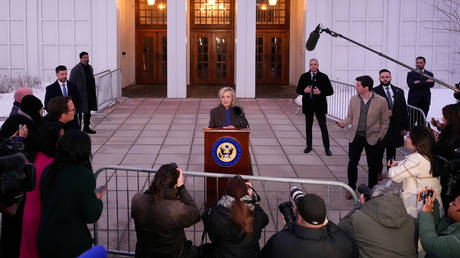
The agency’s director told Congress it had bought a license to use Israeli remote snooping tool Pegasus
The FBI bought a license for banned Israeli spyware program Pegasus, the agency’s director Christopher Wray admitted in a closed session of Congress in December, according to a New York Times report published Saturday. However, they allegedly stopped short of using it amid a flurry of negative publicity surrounding the tool.
While Wray initially claimed the powerful phone-hacking program had been purchased in 2018 only “to be able to figure out how bad guys could use it,” internal agency documents and court records seen by the Times revealed that some agents planned to use it in criminal investigations and had made detailed plans for how to convince the bureau’s leadership to sign off on that use. They only stopped short of actually deploying it because of the growing storm of bad PR as other governments’ abuse of the tech to spy on their own citizens, journalists and political dissidents came to light.
Court documents also suggest the FBI hasn’t completely ruled out using Pegasus in the future – or deploying a similar hacking tool. Pegasus allows the user to remotely take control of the target’s phone, accessing messages, contacts, and the microphone and camera without their knowledge.
The US Department of Commerce blacklisted Pegasus’ developer, NSO Group, last year, forbidding US companies from doing business with it. While NSO protested its tech could not be used to hack American phone numbers, it makes a similar tool called Phantom that is designed to do just that. The FBI tested Phantom as well as Pegasus before shutting down all efforts to deploy the products in July 2021, according to the Times, indicating that it may have considered hacking the phones of Americans as well as foreigners.
Sen. Ron Wyden (D-Oregon) took issue with Wray’s selective confession, calling it “totally unacceptable for the FBI director to provide misleading testimony about the bureau’s acquisition of powerful hacking tools and then wait months to give the full story to Congress and the American people” in a statement to the Times. The bureau “owes Americans a clear explanation as to whether the future operational use of NSO tools is still on the table,” he said. FBI leadership eventually acknowledged in a letter to Wyden that it had purchased a license “to explore potential legal use of the NSO product” as well as the previously-acknowledged “potential security concerns.”
Congress is reportedly drafting a bill to ban government agencies from using foreign commercial spyware tools like Pegasus and Phantom.




